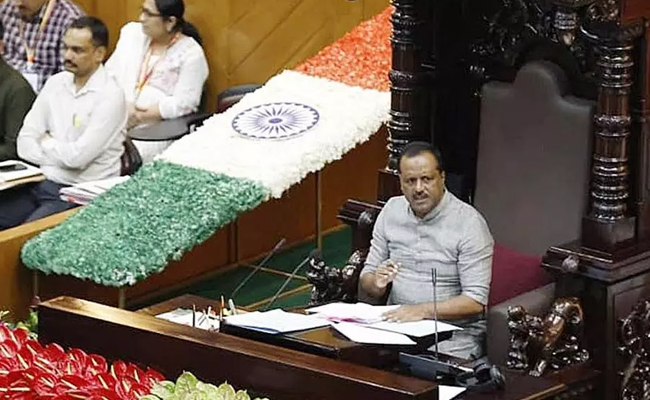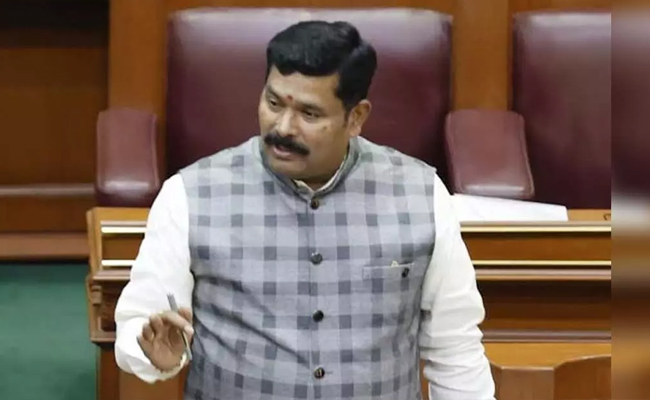Bengaluru, Sep 4: India is one of the fastest growing regions for Augmented Reality (AR) technology and Facebook is providing tools like our AR Studio for developers and creators in the country to help them create unique experiences, a top company executive said here on Tuesday.
Facebook's AR Studio is new software suite -- purpose-built for creators and developers that allow them to easily make stunning visual effects for the Facebook camera.
"India is one of the fastest growing regions for AR technology. Through our cutting-edge creative offerings, we are giving creators and developers power to build for tomorrow with emerging technologies like AR without using any expensive hardware or specialised apps," Satyajeet Singh, Head of Platform Partnerships, Facebook India and South Asia, said in a statement.
Facebook is focused on opening up the AR platform to more people, offering more utility by bringing AR to everyone and their daily habits.
"With 1.5 billion people who have access to Facebook camera today, we want to focus on providing unique experiences, and through the AR studio we are enabling creators to build new ways for them to access AR experiences," the company said as it organised an "AR Day" event here.
AR Studio is currently available on macOs and will soon be available on Windows.
"Myntra has been a pioneer in AR applications. We are looking to partner with Facebook now to bring AR effects into our brand pages, feed and stories on Facebook and to leverage the massive reach of Facebook to bring these experiences and tools to our customers across the various Facebook platforms," said Jeyandran Venugopal, CTO, Myntra.
According to Adhvith Dhuddu, Founder and CEO, AliveNow, they are excited to work on AR studio because it's opened up unique possibilities to build interesting AR experiences for brands and 1.5 billion users on Facebook.
"With face gestures, hand tracking, object recognition and more, we are building for the future with AR camera filters," he added.
Let the Truth be known. If you read VB and like VB, please be a VB Supporter and Help us deliver the Truth to one and all.
Kolkata (PTI): Thousands braved the December chill and waited past midnight to give a rousing welcome to Argentine superstar footballer Lionel Messi as he arrived in Kolkata for his whirlwind three-day, four-city GOAT India Tour 2025.
The Barcelona legend's 2.26 am touchdown in the early hours of Saturday sent the city into a frenzy. Gate 4 of the international arrivals turned into a roaring sea of chants, flags and flashing phones, with fans sprinting between gates for even a fleeting glimpse of their favourite star.
Children perched on shoulders and drums rolled as Messi was whisked out through the VIP gate under massive security. A heavy convoy then escorted him to his hotel, where another huge crowd was waiting deep into the night.
Barricades, police deployment, and non-stop cheering completed a citywide eruption of "Messi mania."
Messi arrived with long-time strike partner Luis Suárez and Argentina teammate Rodrigo De Paul. Over the next 72 hours, he will zip across Kolkata, Hyderabad, Mumbai and Delhi, meeting chief ministers, corporate leaders, Bollywood celebrities and eventually Prime Minister Narendra Modi on Monday.
Sleepless wait ends in disappointment
========================
Despite keeping vigil through the night, the wait ended in disappointment for many fans as they could not catch a glimpse of their icon.
Heavy security meant Messi was whisked out of the airport and taken to his hotel around 3.30 am through a back entrance, giving hundreds of waiting supporters a complete miss.
Only a handful of lucky airport staff managed a fleeting glimpse of the Argentine superstar as he stepped off the private Gulfstream V, looking dapper in a black suit over a white T-shirt, before being driven straight off the tarmac.
The Hyatt Regency lobby turned chaotic as fans sprinted across corridors shouting "Messi! Messi!" that echoed well past dawn.
The lobby resembled an Argentine fan club, dotted with sky-blue jerseys, scarves and flags. Breast-feeding infants clung to mothers, children raced around, and exhausted supporters sank into lobby sofas as the frenzy built up.
Messi checked into Room 730, with the entire seventh floor sealed off to ensure no movement around his suite.
With security at its peak, some fans who could afford it booked rooms in the hotel to stay as close to Messi as possible.
A family from New Alipore checked in a day early just so that their son, Krish Gupta, a Cristiano Ronaldo fan, would not miss a Messi moment.
"I'm a die-hard Ronaldo fan, so what? His biggest rival is coming to my city and I cannot miss the moment. So we planned to stay in the hotel a day in advance," said Krish, a Class 9 student of Birla High School.
He roamed the coffee shop with his mother and elder sister, anxious for a peek at the icon.
"I just want to tell him to play football with me. And if I'm not successful, I will go to the gym tomorrow morning to catch a glimpse of him. I have my autograph book ready and hopefully I will get a selfie."
High hopes
========
Satadru Dutta, the sole promoter of the tour who received Messi at the airport, said the moment was historic for Kolkata.
"In 2011, he had come after becoming the captain, but now he is coming after winning the World Cup and his eighth Ballon d'Or. So, this is really special. I don't think he will come again, so it's about celebration," Dutta told reporters.
He said Messi's presence could give Indian football a real push.
"Never ever have so many sponsors come together for a football star. You can say this is for Messi, but even if 10 per cent of that money comes to the development of Indian football, it would be very big. This statue that has come up and will be unveiled in the morning is also the first-of-its-kind in the world. Messi is set to leave a legacy behind this time," he added.
Security was tightened across the city ahead of Messi's GOAT India Tour, with policemen at every crossing, sniffer dogs checking vehicles and heightened surveillance around the hotel.
Staff were busy preparing the themed decor, including two large three-layered fondant cakes in Christmas colours.
Outside the airport and later near the hotel, massive crowds braved the winter chill to welcome Messi.
Fans waved Argentina flags and jerseys, screamed his name and broke into chants as emotions ran high, some clapping, some crying, many overwhelmed at witnessing a once-in-a-generation legend in their city.
The Hyatt Regency became the epicentre of the frenzy, with street vendors selling scarves, flags and Messi No 10 jerseys.
A few fans turned up in wigs and full Argentine colours. "This is a lifetime opportunity. We will not sleep tonight and will head straight to the stadium in the morning. Today is celebration day," said one fan.
The Itinerary
=========
Messi begins his GOAT India Tour on Saturday with a sponsors' meet-and-greet before heading to the Salt Lake Stadium for a tribute programme featuring music, dance and an exhibition match between Mohun Bagan 'Messi' All Stars and Diamond Harbour 'Messi' All Stars.
He is scheduled to arrive at 10.50 am for interactions with both teams, a felicitation of Bengal's Santosh Trophy-winning side and a "Master Class with Messi" for kids. Luis Suárez, Rodrigo De Paul and Shah Rukh Khan will join the proceedings, with Chief Minister Mamata Banerjee and other dignitaries invited.
Messi will take a lap of honour before a virtual unveiling of his 70-foot statue at Lake Town.
He will then depart for Hyderabad at 2.05 pm for the evening leg at the Rajiv Gandhi Stadium, featuring a short exhibition match, a five-minute appearance by Telangana Chief Minister Revanth Reddy, a football clinic and felicitation.
He then heads to Mumbai for his event at the Wankhede. The leg will also feature a 45-minute philanthropic fashion event with Suárez and De Paul, preceded by a Padel Cup at the CCI.
The tour ends in Delhi where Messi will meet Prime Minister Narendra Modi. Minerva Academy's triple youth-trophy winners will be felicitated, followed by a nine-a-side celebrity match.
Kolkata's tryst with footballers
===================
Kolkata's bond with football royalty dates back to 1977 when Pele's New York Cosmos played a 2-2 draw against Mohun Bagan at Eden Gardens.
Pele returned in 2015 to greet the class of '77, telling the crowd: "You can never have another Pele."
Brazil's Dunga, Bebeto and Mauro Silva, and Colombia's René Higuita who showcased his scorpion-kick saves in 2012 all drew big turnouts. German great Oliver Kahn's 2008 farewell match at Salt Lake Stadium pulled more than one lakh spectators.
But no one stirred the city like Diego Maradona, whose 2008 and 2017 visits saw near-unprecedented crowds line the streets and stadiums. Uruguay's Diego Forlán, fresh from his Golden Ball win, received a similarly rousing welcome in 2010.
Then in 2011, Messi had visited the city captaining Argentina for the first time on foreign soil, leading them to a 1-0 win over Venezuela in an FIFA international friendly before a packed Salt Lake Stadium.





